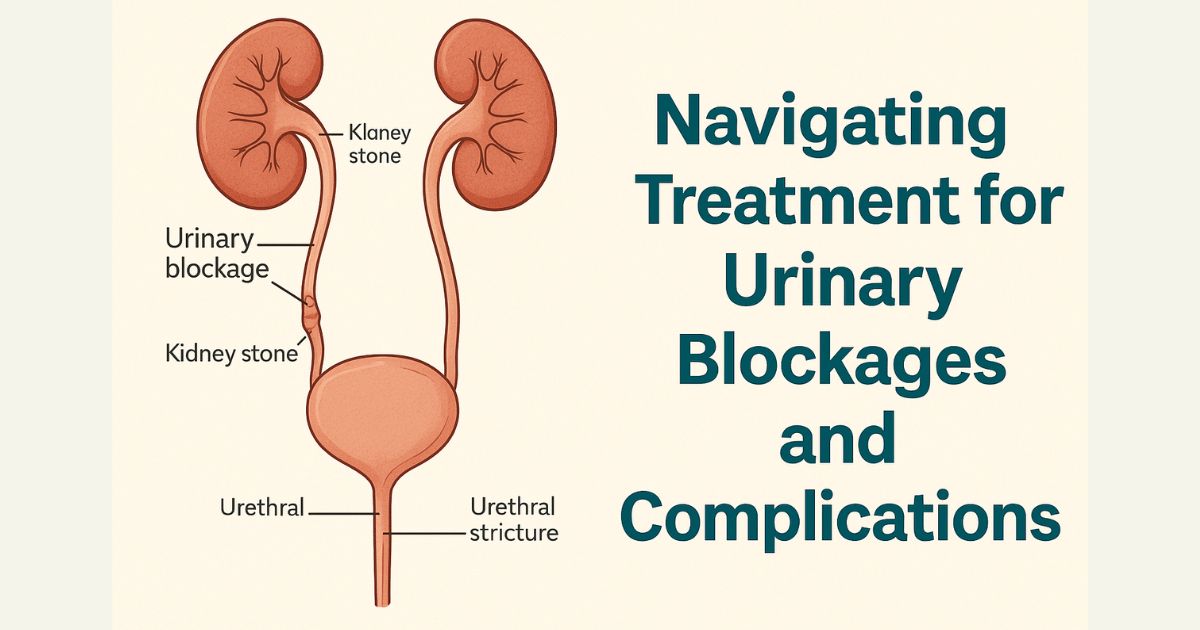
Urinary blockages and related complications can significantly affect one’s health and quality of life. From difficulty in passing urine to frequent infections and kidney damage, these conditions require timely intervention from medical experts. A urology specialist in Chennai can quickly identify the problem and suggest the right treatments based on how serious the condition is and its cause. Often, working with nephrologists is important to protect kidney function and avoid more issues.
Understanding Urinary Blockages
Urinary blockages refer to any hindrance that limits the usual flow of urine through the urinary system. This obstruction can happen at different locations, such as the kidneys, ureters, bladder, or urethra. The blockage may be either partial or total, resulting in discomfort, pressure, and potential harm to the urinary system if not addressed promptly.
Common causes of urinary blockages include:
- Kidney stones
- Enlarged prostate in men
- Urethral strictures
- Tumors or abnormal growths
- Congenital abnormalities in children
- Scar tissue from past infections or surgeries
The signs can differ depending on where the blockage is and how severe it is. Some people might feel pain in the lower abdomen, notice a decrease in urine production, frequent trips to the bathroom, or even find blood in their urine. If these concerns are not attended to, they may result in more severe problems like urinary tract infections (UTIs), harm to the bladder, and kidney failure.
Diagnostic Approaches to Identify the Problem
Precise diagnosis is fundamental to successful treatment. Medical professionals employ various diagnostic tools to identify the type and location of the obstruction. These include:
- Ultrasound scans: A non-invasive test to detect swelling or obstruction.
- CT scan or MRI: Detailed imaging to locate the exact point of blockage.
- Urinalysis: Helps in identifying signs of infection or blood.
- Cystoscopy: A method involving a slender tube equipped with a camera that is inserted into the urethra to examine the lining of both the bladder and the urethra.
Early and precise identification of urinary complications allows physicians to tailor treatments that are both effective and minimally invasive.
Treatment Options for Urinary Obstructions
Once the root cause is established, treatment may involve a combination of medication, surgical intervention, or supportive therapies. Below are some of the commonly recommended treatment strategies:
1. Medications
For mild cases or when inflammation is a factor, medications can help reduce swelling and improve urine flow. Alpha-blockers, antibiotics (for infections), or medications to dissolve small stones may be prescribed.
2. Catheterization
Temporary relief for complete blockages may involve catheter insertion to drain urine and relieve pressure from the bladder.
3. Surgical Procedures
Surgical alternatives depend on where the obstruction is situated.
- Ureteral stenting or nephrostomy tubes for kidney or ureteral blockages
- Transurethral resection of the prostate (TURP) – enlarged prostate
- Urethrotomy for urethral strictures
- Stone removal surgeries, including ureteroscopy or percutaneous nephrolithotomy (PCNL)
Minimally invasive procedures such as laser therapy are increasingly used to ensure faster recovery with fewer complications.
Role of Nephrologists in Complicated Cases
While urologists manage the structural aspects of the urinary tract, nephrologists focus on kidney function. If the blockage has led to kidney dysfunction or chronic infections, the expertise of the best nephrologist in Chennai becomes vital.
Nephrologists work closely with urologists to:
- Monitor kidney function using blood tests and imaging
- Prescribe medications that protect or improve kidney performance
- Guide patients with chronic kidney disease (CKD) in managing lifestyle and diet
- Recommend dialysis or transplant in cases of end-stage renal failure
This collaborative approach ensures that both the cause and consequence of urinary blockages are effectively managed.
Long-Term Management and Prevention
Even after treatment, patients are advised to take proactive steps to avoid recurrence or further complications. Long-term care may include:
- Regular follow-up visits with both urologists and nephrologists
- Hydration and diet control to reduce stone formation or infection risk
- Monitoring blood pressure and diabetes, both of which can affect kidney health
- Avoiding medications that may strain the kidneys, unless prescribed
In cases involving anatomical abnormalities or recurring issues, personalized care plans may be suggested, including lifestyle changes and periodic screenings.
Pediatric and Geriatric Considerations
Urinary blockages can affect all age groups, but the approach differs for children and the elderly. In children, congenital defects are often the primary cause. Pediatric specialists may perform reconstructive surgeries or recommend treatments that ensure normal urinary development.
For the elderly, prostate enlargement or long-standing medical conditions like diabetes can lead to obstructive uropathy. Special care is required to balance treatment with existing health concerns such as cardiovascular disease or mobility issues.
The Importance of Early Intervention
Delays in treatment can result in severe and sometimes irreversible damage. Recognizing early warning signs—painful urination, frequent UTIs, or reduced urine flow—should prompt immediate consultation with a specialist. Modern healthcare facilities offer comprehensive urology and nephrology services, making early diagnosis and minimally invasive treatments accessible.
Timely treatment not only preserves urinary function but also enhances overall health, especially when combined with consistent medical follow-up and a health-conscious lifestyle.
Final Thoughts
Urinary blockages and complications are manageable with prompt medical attention and the right blend of expertise. Combining the skills of urologists and nephrologists ensures a holistic approach to treatment—restoring urinary flow, preserving kidney health, and improving life quality. Regardless of whether the issue is short-term or persistent, obtaining appropriate treatment from knowledgeable experts can greatly impact recovery and overall health in the long run.